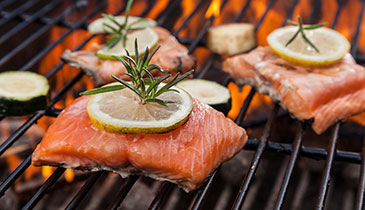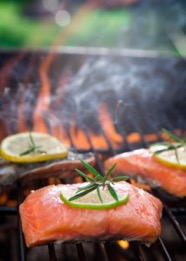 Source: Experience Life
Source: Experience Life
Instead of steak or chicken, turn up the heat on a piece of fish this summer and reap some tasty and healthy benefits.
It’s the sweet time of year again when taking dinner outside is a sure sign that the long-anticipated warm months are upon us. Step outdoors in the evening and you’re likely to detect the mouthwatering, savory aroma of a neighbor’s grill and the sound of laughter and merrymaking.
For many folks, the thrill of the grill immediately conjures up thoughts of burgers, steaks, and hotdogs. But for those of us looking for a lighter alternative, fish is unbeatable. Sure, there’s nothing like a hot, juicy burger right off the grill, but the heavier red meats can leave us feeling weighty when the mercury creeps up. During these warm months, a nice salmon or swordfish steak with savory grilled vegetables really hits the spot and leaves us with a light, buoyant energy, perfect for enjoying the longer days of summer.
 Healthy, Fabulous Fish? Fish consumption has been attributed to Asian and European cultures’ generally healthy populations and Americans can certainly benefit from eating more of this healthy meat. Fish is a fantastic source of low-calorie, high-quality protein and a healthy goal is to incorporate it into your diet twice a week.
Healthy, Fabulous Fish? Fish consumption has been attributed to Asian and European cultures’ generally healthy populations and Americans can certainly benefit from eating more of this healthy meat. Fish is a fantastic source of low-calorie, high-quality protein and a healthy goal is to incorporate it into your diet twice a week.
Fatty fish including trout, tuna, and salmon are high in Omega-3 fatty acids, which may reduce the risk of heart disease, lower triglyceride levels, increase HDL cholesterol, help minimize inflammation and blood clotting, and keep blood vessels healthy.
Speaking of Mercury For those of you concerned with mercury toxicity in our fish supply, recent studies have shown that the nutritional benefits of eating fish twice a week far outweigh the possible risks. According to Dariush Mozaffarian, Assistant Professor in the Department of Epidemiology at Harvard University and lead author of a study at the Harvard School of Public Health on the benefits of eating fish, “It is striking how much greater both the amount of the evidence and the size of the health effect are for health benefits, compared with health risks. Seafood is likely the single most important food one can consume for good health.”
Seafood is likely the single most important food one can consume for good health. If you’re still troubled by mercury content in our fish supply, wild fish, especially Alaskan salmon, is the best choice. It’s chock full of Omega-3 fatty acids and is less likely to contain mercury and other contaminants. Try to avoid farmed salmon. According to Dr. Andrew Weil, M.D. and founder of the Program in Integrative Medicine in Arizona, “Avoid farmed salmon (also called Atlantic salmon), which is what you mostly find in supermarkets, restaurants, and fish markets. While less expensive than wild salmon, farmed salmon is lower in Omega-3s and may contain residues of antibiotics and other drugs used to treat diseases in fish farming pens. What’s more, levels of PCBs and other contaminants in farmed salmon have been found to be much higher than those found in wild salmon.”
Hot and Fast Grilling fish is quick and easy and is great for when you’re having guests or want a protein-rich meal pronto. The direct heat cooks the fish fast, without removing any precious moisture, leaving your steak juicy and oh so flavorful.
Choosing the right fish will make the difference between fetching torn pieces from the clutch of the fire and a juicy, intact steak. Flaky fillets that are sold skinless like cod, haddock, sole, flounder, sable, and tilapia should steer clear of the grill. Salmon, tuna, bluefish, swordfish, and small whole fish like red snapper, sea bream, and trout are particularly great candidates.
You’ll want to preheat the grill to high and then brush with oil just before adding the fish. Do not remove any skin and cook this side first. To avoid the pitfall of torn skin, slip the tines of a fork between the grill grates and gently lift up on the fish. Do this in a few places until the grill releases its grip.
Fresh lemon juice and melted lime butter are good to have handy while your fish is cooking. You can brush these on as you’re grilling to add flavor and keep the fish moist. Just remember that butter burns easily, so brush it on gingerly. Yet the best-tasting grilled fish I’ve had has been simply prepared with salt, pepper, and olive oil.
When fish is cooked, the meat will flake easily with a fork. A good estimate is 8 minutes per inch of thickness. To test for doneness, cut halfway into your steak and peer inside. It should still be just a tad translucent when removed from the heat, even if you prefer your fish well done.
So next time you’re ready to fire up the grill, add a little steam and sizzle to the show with your lemon juice-drizzled swordfish or butter-brushed wild salmon. Your taste buds, family, and guests are sure to savor and appreciate the departure from the familiar.
Before you shop, check out this handy pocket guide to fish choices and safe seafood recommendations that are science-based, peer reviewed, and use ecosystem-based criteria.




